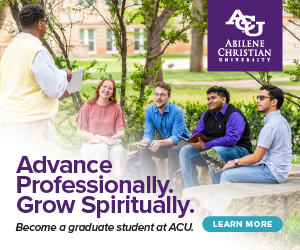-by David Kneip, associate professor of Bible.
An oft-quoted saying with regard to free speech goes something like this: “I disapprove of what you say, but I will defend to the death your right to say it.” Often mis-attributed to the 18th-century French philosopher known as Voltaire, the quote certainly reflects the budding “freedom” movement of that era, which blossomed strongly with events like the American Revolution and texts like the Bill of Rights.
To be sure, this statement is wholly modern—it reflects modern sensibilities—but it is not particularly Christian. I write this because ACU’s chapter of the Young Americans for Freedom has recently erected a “wall” on campus that they intend to tear down as a celebration of Veteran’s Day and a commemoration of the fall of the Berlin Wall in 1989.
However, per YAF’s instructions, the ACU chapter has inscribed various things on their wall that they claim to be “ways in which their freedoms are being infringed upon.” As of Thursday afternoon, the phrases mirror those found at the YAF website: “microaggressions,” “safe spaces,” and “trigger warnings.” Presumably, these phrases are meant to reflect concerns expressed by many cultural observers about a perceived “fragility” on the part of college students; see, as just one example, George F. Will’s September 12 column in the Washington Post.
Unfortunately, critiques of these ideas, and of the policies and movements that encourage us to be mindful of them, often degenerate into attacks on the individuals who might ask us to be mindful of them, or whom they might benefit. And as a university, this is where things get difficult. As an educational institution, we seek both to challenge and to care for one another, and sometimes those aims clash with one another.
On the one hand, it is critical to our mission for learners to be exposed to ideas that challenge them. We know that the process of “doing difficult things” helps us learn in ways that rote repetition of simple tasks does not. We want to reason well, and one way to build cognitive “muscle” comes from lifting difficult intellectual and conceptual weight. To these ends, free speech is a critical component, as we must be able to hear views with which we disagree.
However, in many cases, we want to learn, and yet we face difficulties that are not of our own making and over which we have little to no power. Just to name a few: we may come from families marked by divorce or addiction; we may have been abused, neglected, or otherwise traumatized; we may have experienced significant losses in the recent or distant past. As we learn, we may become overwhelmed—not through hot-button topics or social issues, but rather because a course’s subject matter hits close to home, through discussing child abuse in a social-work class, grief in a psychology class, or the exploitation of workers in a business class. Learners such as these may benefit from institutional policies that express care for students.
And this is where our Christian identity is crucial. Free speech is an American virtue, but it is not necessarily a Christian one. The letter of James specifically teaches us to be “quick to listen and slow to speak” (1:19). Paul’s letter to the Romans includes instructions to “honor one another above yourselves,” to “bless and not curse” those with whom we disagree, and to work hard to live at peace with everyone (12:9, 14, 18). Jesus himself blesses the merciful and the peacemakers (Matthew 5:7, 9).
As a result, on the principles of free speech, I do not reject the building of our “wall”; the end of World War I (the source of our Veteran’s Day celebration) and the end of Russian Communism are events celebrated by many Americans. But I would encourage the builders of that wall (and all of us) to examine ourselves. If we are followers of Christ, the one who had everything but gave it up for us and for our salvation (Philippians 2:5-11), is it really best to demand our own rights of free speech? Should we really build a wall, write phrases on it that allude to our brothers and sisters, and literally break it down with hammers? How is that possibly hospitable? As Paul says regarding disputes among Christians, “Why not rather be wronged? Why not rather be cheated?” (1 Corinthians 6:7).
To my brothers and sisters who feel that their speech has been infringed by movements in higher education that call us to care for one another: let’s talk—conversation is welcome here. And to my brothers and sisters who are sometimes overwhelmed by life (that’s most of us, I daresay), who are sometimes overlooked, who are ignored, and who are otherwise disadvantaged by those of us in places of cultural superiority: you are welcome here. Let’s keep talking.


